On Criterion’s very attractive DVD release of Alex Cox’s Walker, there’s a pretty funny bonus feature consisting of Cox reading aloud from the almost exclusively negative and dismissive U.S. reviews that the film received when it came out in 1987. I’m sorry that he doesn’t read from — and apparently wasn’t aware of — my near-rave in the Reader, written during my first year at the paper, so I’m reprinting it here.
For me, this ties in with the surprisingly warm and appreciative welcome accorded to William Klein’s Mr. Freedom (1967) when I showed it in my 60s world cinema course a few years ago. It even sold out every ticket at the Gene Siskel Film Center’s larger auditorium, which I doubt would have happened even in the 60s. I guess it takes a George W. Bush or a Donald Trump to make 60s radicalism both fashionable and available again.
(For more on William Klein, go here.)
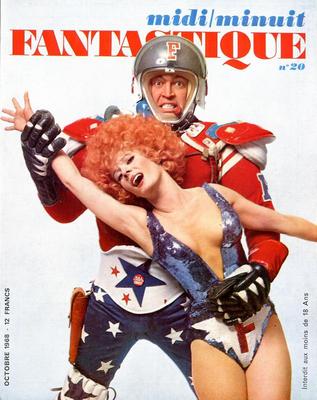
Walker is scripted by the novelist Rudy Wurlitzer — who also wrote Two-Lane Blacktop (also recently released on an excellent Criterion DVD set) and has recently published his first novel in almost a quarter of a century, The Drop Dead of Yonder, a sort of Buddhist Western which I strongly recommend. Read more
I’d completely forgotten about my having written this piece until I came across it recently here, complete with the photo of me (apparently in late 1999) delivering this paper at a panel discussion in Chicago. Apart from correcting a few typos and adding some other photos, I’ve reproduced it here more or less as I found it. (Afterword, April 2, 2015: I’ve done a light edit on this.) — J.R.
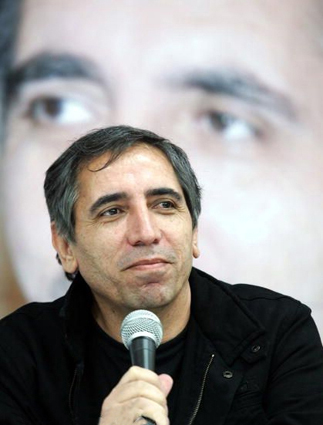
It’s tempting but dangerous to approach artists from exotic cultures in terms of more familiar reference points such as comparing Zhang Yimou’s Ju Dou to The Postman Always Rings Twice or reading Souleymane Cissé’s Brightness as if it were an African Star Wars, as some American and English critics have done. Yet to describe the styles and visions of the two major Iranian filmmakers of the Eighties and Nineties, Abbas Kiarostami and Mohsen Makhmalbaf, I’ve been exploring comparisons to Leo Tolstoy and Fyodor Dostoevsky — a project obviously fraught with booby traps, but one that none the less clarifies some of the important differences between these two major figures.
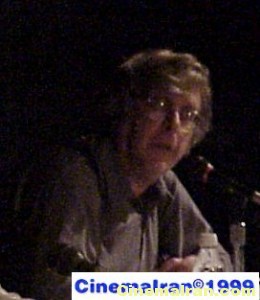
A key difference which has only an oblique relevance to my comparison is that Makhmalbaf has been the most popular and respected filmmaker in Iran in recent years, despite his many run-ins with state censors, while Kiarostami is a hero principally elsewhere. Read more
From the Chicago Reader (November 19, 1999). — J.R.
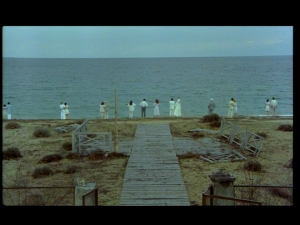
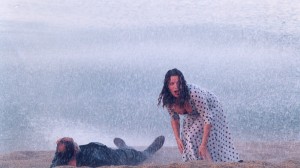
Winner of the 1998 Palme d’Or at Cannes, this rambling but beautiful feature by Theo Angelopoulos may seem like an anthology of 60s and 70s European art cinema: family nostalgia from Bergman and seaside frolics from Fellini; long, mesmerizing choreographed takes and camera movements from Jancso and Tarkovsky; haunting expressionist moods and visions from Antonioni. Yet it’s so stirring and flavorsome — far richer emotionally and poetically than Woody Allen’s derivations — that I was moved and captivated throughout its 132 minutes. Bruno Ganz is commanding as a Greek writer who’s recently learned that he’s terminally ill; the part was conceived for the late Marcello Mastroianni, yet Ganz seems perfect for it (though he’s dubbed by a Greek actor, as Mastroianni undoubtedly would have been). Brooding over the loss of his seaside retreat and family home in Thessaloniki, the hero meets an eight-year-old illegal alien from Albania (Achilleas Skevis) and spends the day crisscrossing the past and visiting his familiar haunts, sometimes in the flesh and sometimes in his imagination, and Angelopoulos is masterful in orchestrating these lyrical and complex encounters. With Isabelle Renauld. Music Box, Friday through Thursday, November 19 through 25. Read more





